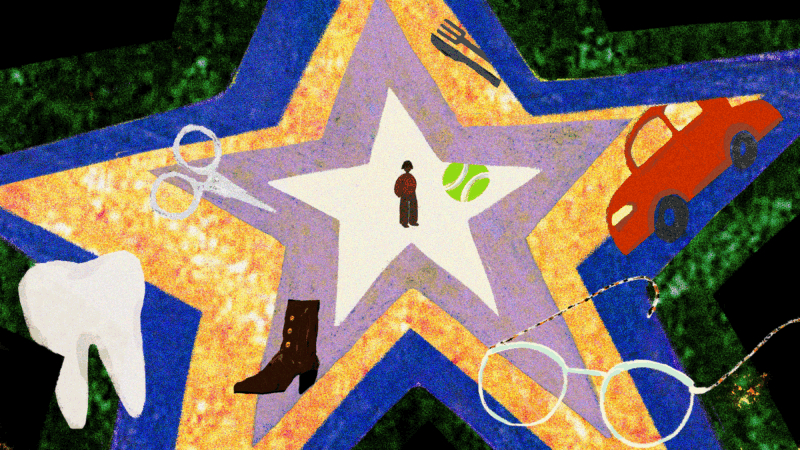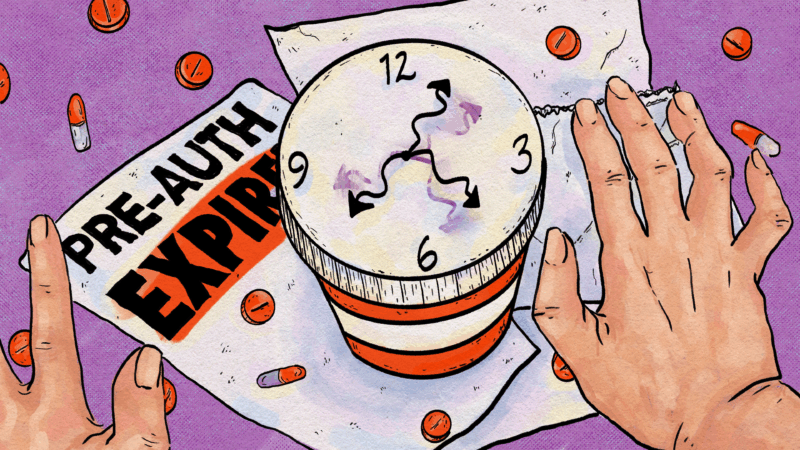Mental Health Stigma


 | Birmingham — When you step off the elevator into UAB’s Mental Health Center, there’s one word you�ll find on notices, information forms and even verbal exchanges. The word is consumer. And it’s an attempt to de-stigmatize mental illness… make therapy, addiction recovery and other treatments products more like aspirin or X-rays. It also brings home the point that mental health care is no different than health care.
| Birmingham — When you step off the elevator into UAB’s Mental Health Center, there’s one word you�ll find on notices, information forms and even verbal exchanges. The word is consumer. And it’s an attempt to de-stigmatize mental illness… make therapy, addiction recovery and other treatments products more like aspirin or X-rays. It also brings home the point that mental health care is no different than health care.
But it can be a hard sell sometimes, as mental health consumer Steve Puckett knows all-too-well. For years, he battled periods of depression, but continued on day-to-day because he didn�t realize he was suffering from something worse.
 “I kinda got accustomed to the ups and downs. What would happen is I would pull myself out of the depression – the deep depression – after three or four months of basically inactivity and isolation. And then things would be fine.”
“I kinda got accustomed to the ups and downs. What would happen is I would pull myself out of the depression – the deep depression – after three or four months of basically inactivity and isolation. And then things would be fine.”
But those periods expanded over time and soon, the depression was debilitating. Work suffered. Home suffered.
Then, in 1991, after a business failure and the death of his mother, Puckett attempted suicide. And did it again and again… at least a half dozen times in just a few years.
“It really wasn’t until I got so low that I planned out how I was going to kill myself. And it wasn’t until that point that I wound up in the hospital and almost died that I woke up like three days later and realized I was still alive. And I felt like ‘oh no, I screwed this up…'”
He says he was reluctant to seek treatment at first because, number one, he didn�t think anything was wrong medically – he was just down in the dumps. And number two – others didn�t understand what he was going through. No one close to him saw the warning signs.
Eventually, Puckett was diagnosed with Bipolar Disorder and spent a year in the hospital… an all-too-familiar tale, according to mental health experts.
“You can’t pull yourself up by the bootstraps. It’s not… you don’t will yourself into having mental health problems. And because of that, you can’t will yourself out of it. You really need to seek treatment.”
But Dr. Jackie Feldman, Director of UAB’s Mental Health Center, says a disproportionate number of people don�t seek treatment. They don’t know or aren�t sure about mental illness, or maybe they believe prayer and faith in God will work. It could be they’re afraid of it.
 “I think people look at people with mental illness… and it’s scary. They see somebody who’s walking down the street who’s talking to himself, who’s not very well-kempt, and they find that they’re scary. And what do you do when you’re scared of someone or something? You push them away… or you make light of them… or you denigrate them… or you ignore them.”
“I think people look at people with mental illness… and it’s scary. They see somebody who’s walking down the street who’s talking to himself, who’s not very well-kempt, and they find that they’re scary. And what do you do when you’re scared of someone or something? You push them away… or you make light of them… or you denigrate them… or you ignore them.”
In Steve Puckett�s case, it was mostly embarrassment and financial issues that kept him from seeking treatment, a common problem. Nowadays, Puckett participates in several day treatment forums, covering topics such as coping and positive thinking.
Nearly 100,000 people in Alabama are being served through the Department of Mental Health and Mental Retardation. Yet officials there say another 200,000 who need treatment don�t seek it. And if you add in the thousands of other victims of mental illness who don�t go through the state, but utilize private and for-profit hospitals for mental health services, that number grows even higher.
There is also an even greater disparity in treatment among African-Americans… because of overall distrust of doctors and the belief that prayer and faith can bring upon healing without treatment.
It is an uphill climb, according to Mental Health Commissioner Kathy Sawyer.
“It is very difficult to shape public policy and to drive funding adequate resources when the general public and the lawmakers, policy-makers, do not have a true and full understanding of the prevalence of the problem.”
The costs to society are high. A survey by the National Alliance for the Mentally Ill finds that two-thirds of mental health patients are unemployed and almost half have been through the justice system.
That’s why the Department of Mental Health continues a media campaign geared to de-stigmatize mental illness.
 “You have to just keep at it… and you have to use all forms of mediums to get information out.”
“You have to just keep at it… and you have to use all forms of mediums to get information out.”
They went to news organizations to educate reporters about mental health stigmas and bought billboard space statewide to put a face on mental illness. One of those billboards said not to judge based on DISability, but ability. Another billboard said the mentally ill can vote.
To prove just how far reaching the mental health stigma is, even a couple of lawmakers said they didn�t realize the mentally ill can vote.
“Stigma is nothing more than ignorance that can only be cured with knowledge.”
And if knowledge is a cure for stigma, mental health experts can do more than just dream of a cure for some of the problems their consumers face.
~Steve Chiotakis, January 17, 2005
Editor’s note: This is our first story in a year-long commitment to covering mental health issues in Alabama. You can learn more about our “Making Sense of Mental Health”
project and find local mental health resources — as our commitment continues throughout the year — inside this website.
 | Alabama Department of Mental Health and Mental Retardation
| Alabama Department of Mental Health and Mental Retardation
 | National Mental Health Association
| National Mental Health Association
Feds announce $4.1 billion loan for electric power expansion in Alabama
Federal energy officials said the loan will save customers money as the companies undertake a huge expansion driven by demand from computer data centers.
Mortgage rates fall below 6% for the first time in years
The average home loan rate has dropped below 6% for the first time since 2022. Will that help thaw the frozen housing market?
Pentagon shifts toward maintaining ties to Scouting
Months after NPR reported on the Pentagon's efforts to sever ties with Scouting America, efforts to maintain the partnership have new momentum
Why farmers in California are backing a giant solar farm
Many farmers have had to fallow land as a state law comes into effect limiting their access to water. There's now a push to develop some of that land… into solar farms.
Every business wants your review. What’s with the feedback frenzy?
Customers want to read reviews and businesses need reviews to attract customers. But the constant demand for reviews could be creating a feedback backlash, experts say.
Can’t get a prescription renewed? Here’s how to cope with prior authorizations
These health care hurdles can stand in the way of getting treatment your doctor says you need. Here's what to know about how to deal with them.







